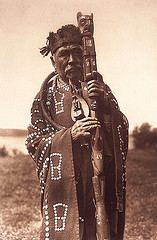June is Aboriginal History month, a time to recognize and honour the cultures and contributions of Aboriginal people in Canada. The SBA would like to take
 this opportunity to highlight a few resources for aspiring entrepreneurs that identify as Aboriginal.
this opportunity to highlight a few resources for aspiring entrepreneurs that identify as Aboriginal.
In recent years Aboriginal entrepreneurship has seen a dramatic increase. According to the Business Development Bank of Canada there are more than 27,000 Aboriginal Entrepreneurs in Canada. For a sense of the breadth and variety of business initiatives taking place in BC check out the BC Aboriginal Business Awards! In spite of these successes, John McBride and Ray Gerow of the Community Economic Development Centre at Simon Fraser University found that Aboriginal business owners face additional challenges including “a lack of business services, information and support” (McBride & Gerow, 2010).
One innovative program working to address this gap is located right here at UBC: Ch’nook Indigenous Business Education. The SBA caught up with Danielle Levine, Associate Director of Ch'nook Indigenous Business Education to find out more about what they offer and how they serve aspiring entrepreneurs throughout BC.
SBA: Can you describe Ch’nook Indigenous Business Education? What are the goals of this initiative?
Danielle: Ch’nook’s mission is to promote business, management and entrepreneurship as viable career opportunities for Aboriginal students in order to contribute to creating a sustainable and self-sufficient economic future for First Nation, Metis and Inuit communities in British Columbia and across Canada.

The Ch’nook initiative has three pillars: Senior Aboriginal Leaders, Post-Secondary Students and High School Students by which it contributes to community-based economic development through a dual focus on fostering student interest in and engagement with post-secondary business education opportunities and on supporting Aboriginal business leaders and entrepreneurs in developing crucial business skills and capabilities.
Ch’nook’s goal is to increase Aboriginal participation in business education and business/economic opportunities generally.
SBA: Why is the Ch’nook program and initiatives like it so important?
Danielle: The Ch’nook initiative is important because economic self-sufficiency means successful Aboriginal businesses run by Aboriginal managers. However, the facts are that Aboriginal communities in Canada are typically marginalized, have very low employment participation rates, and have limited economic infrastructure (Kunkel et al., 2011).
Business is not a popular educational choice for many Aboriginal people. For example, personally I never imagined that I would complete an MBA or work at a school of business! I saw myself becoming a social worker or teacher.
More popular educational programs for Aboriginal students are Arts, Social Work, Teaching, etc. Many Aboriginal people are not aware of the opportunities that business education offers. The Cousins program is designed to get young people interested in business as a career. The Scholars program is designed to assist Aboriginal post-secondary students while they are studying business in BC educational institutions. And, the Advanced Management Program (AMP) is for Aboriginal leaders who require business education in their jobs.
SBA: What is the Indigenous Business Education Network and how does it benefit students?
Danielle: The Indigenous Business Education Network is a platform for extending Ch’nook initiatives and resources out to Ch’nook alumni and all full-time and part-time Aboriginal students studying business or management in any one of our 25 Ch’nook Accord Partner institutions in British Columbia.
In doing this, we are acting on the need to recognize the unique and sometimes challenging situations and commitments faced by many Aboriginal students while trying to pursue a business education. Consequently, Ch’nook provides Aboriginal students and our Accord Partners with access to a wide range of resources and opportunities for learning and achieving their goals. The Indigenous Business Education Network includes:
- Scholarships and bursaries
- Conferences
- Individual student mentoring opportunities across the province
- Vancouver based and regional internship opportunities
- Exposure to Canadian and global businesses through designing and organizing international travel for Aboriginal business and management students
- Online career planning tools
- Province wide job postings
- Educational funding sources
Please visit the Ch’nook Indigenous Business Education website to learn more.
For those of you who are not students, you'll be happy to hear that there are several Aboriginal business support organizations and resources available for aspiring Aboriginal entrepreneurs.
General business support:
- Aboriginal B.E.S.T.
- Aboriginal Business Service Network
- Industry Council for Aboriginal Business
- Aboriginal Business Incubator (fee-based service)
- First Nations in British Columbia - Economic Development
For funding information:
Publications and Statistics:
References:
Kunkel, T., Schorcht, B. & Brazzoni, R. (2011) Aboriginal business capacity building programs in the central interior of British Columbia: A collaborative project between the university and communities. Canadian Journal of University Continuing Education. 37 (1)
McBride, J. & Gerow, R. (2010) Minding our own businesses: How to create support in First Nations communities for Aboriginal business. Burnaby: Community Economic Development Centre at Simon Fraser University.
Photo credits:
Hamasaka in Tlu Wulahu costume with speaker's staff Qagyuhl, British Columbia. Created by Edward S. Curtis circa 1914. Photo made available by Library and Archive Canada under Attribution 2.0 Generic Licence. Last viewed June 27, 2012
Ch'nook AMP and Scholars Class of 2012. Created by Ch'nook UBC. May 18, 2012. Photo used with permission of Ch'nook UBC. Last viewed July 3, 2012.
We value your input. If you have feedback, resources or recommendations for the SBA please contact us by email at lib.sba@ubc.ca or fill out our online survey.



